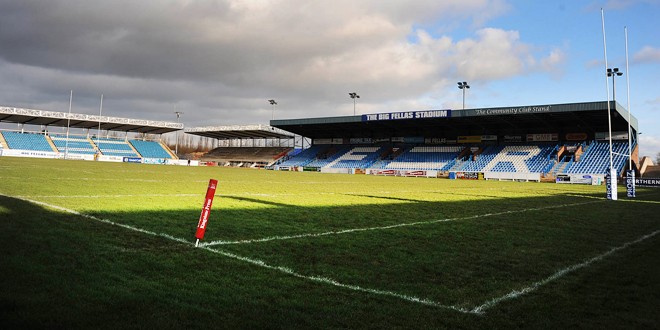
Among a scramble of six clubs vying for a spot in Super League, one, in particular, has been portrayed as an ugly duckling.
While expansionists have clamoured for London, Toulouse or York and traditionalists have endorsed Bradford and Leigh, Featherstone Rovers have been given little to no acknowledgement. In fact, their merits have been dismissed within public domains without a moment’s thought.
Featherstone are guilty of association to their reputation and guilty of what many believe their selection would stand for symbolically. Yet their reputation is one they have unfairly inherited and to judge a club’s prospects only on perception is equally harsh.
The phrase ‘flat cap’ has derived a derogatory meaning within rugby league – an insult used to criticise someone of short-sightedness and narrow-mindedness. Featherstone supporters have proudly worn flat caps as a symbol of their support to the club for many years. Inevitably, a link has been made.
Yet the association of the club and the term is unfair. The opportunity to apply for ‘promotion’ to Super League has come as a result of Toronto’s expulsion, a decision approved by seven clubs all based on the M62. Yet Featherstone, and their chairman Mark Campbell, was among the strongest, most vocal supporters of the Wolfpack since their inception. He was also the first chairman to publicly slam the decision made by Super League and its clubs, knowing all too well it would do nothing to help his case for approval from a seven-man panel featuring three members of Super League’s executive.
Over the years their investment in marketing and publicity has surpassed many other clubs in an attempt to promote their brand and their club. Ryan Sparks, the club’s head of communications between 2016 and 2018, is now the CEO of Bradford City Football Club.
The other thing they are guilty of is their geography, or perhaps, more specifically, the geography of two other clubs.
Featherstone’s ground is within a five-mile radius of Castleford and Wakefield’s and all boast a WF postcode. That, however, is not Featherstone’s fault.
To truly see the merits in Featherstone Rovers to Super League, you first have to put reputation and assumptions to one side.
Once you do, you realise there is worth behind their proposal.
On the field, they have been the most consistent team outside of Super League over the past decade. In their last ten seasons, they have finished in the top five of the Championship every season, finishing top on four occasions. Last year, they narrowly missed out on promotion to Super League as they were defeated by Toronto in the play-off final.
Their ground has recently undergone renovation that has increased capacity to almost 10,000. It could be argued that it is the best rugby league facility in the postcode. Attendances were also up last season. The site is owned by the club and has its own training facility, which has in fact, in years gone by, been used by neighbours Wakefield. Wakefield AFC, the city’s football team, also play there.
In 2019, the club relaunched their reserve grade, something that often goes ignored due to the disapproval of their strong dual-registration partnership with Leeds Rhinos. However, the club has continued to sign development players this year out of reserve grade systems.
Financially they are stable and while their geographical footprint will inevitably draw concerns, the Wakefield district has a population of 350,000. While Featherstone itself has a population of around just 20,000, their presence stretches to Ackworth, Hemsworth and Pontefract.
Featherstone, like all other applicants, have both their strengths and their weaknesses.
But to cast them aside based on pre-formed assumptions is unwise and unfair.
